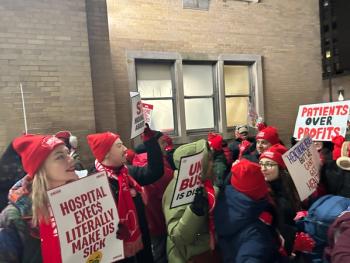
State hospital leaders say Medicaid cuts ‘are cuts to care’
Several state hospital groups are warning of reduced access to care for patients, and more financial pressures for health systems. Hospitals can’t just absorb cuts, they said.
Healthcare leaders condemned the federal tax package that will bring big changes to Medicaid programs, and state hospital groups warned that it’s bad news for patients and health systems.
Congress signed off on the tax bill last week, and hospitals immediately said that
National hospital and healthcare advocacy groups said the cuts are unprecedented and the damage could be long-lasting. But state hospital leaders also shed light on the potential impacts on patients and providers.
Brian Peters, CEO of the Michigan Health & Hospital Association, said in
“The bill is an attack on Medicaid,” Peters said.
Congressional Republicans inserted provisions limiting how much states can assess in provider taxes to fund their Medicaid programs. The Trump administration is shifting more of the responsibility of Medicaid onto states, who have to decide between raising spending (and other taxes) to finance programs or reduce the number of people getting care.
“Cuts to funding are cuts to care,” Peters said. “Limiting how states can fund their Medicaid programs puts Michigan in an extremely difficult position. If the state can no longer provide the same reimbursement, hospitals will be faced with difficult choices that will include eliminating service lines or even entire facilities.”
Carmela Coyle, president & CEO of the California Hospital Association, said it’s possible that the state’s hospitals could lose up to 30% of their revenues from Medi-Cal, the state’s Medicaid program, over the next 10 years.
“The cuts to the Medicaid program will mean real harm to real people in communities large and small across California,” Coyle said in a statement. “These are the largest cuts to our health care system ever enacted and are far too deep for hospitals simply to ‘absorb.’”
“Hospitals will be forced to make difficult decisions, and access to vital health care services will be jeopardized for all Californians — not just those who rely on Medi-Cal for their health care coverage,” Coyle said.
Brian Frazee, president & CEO of the Delaware Healthcare Association, said the tax bill’s hypotheticals are “a terrifying reality.”
Frazee warned of families, seniors, and those with disabilities falling through the cracks. More of those individuals will end up in emergency departments because they can’t get care.
“Hospitals will undoubtedly face strains to critical resources, overburdening the healthcare workforce, stunting innovation, and risking healthcare access,” Frazee said in a statement. “Hospitals will continue to step up to pick up the pieces of this disastrous policy, but the reality is, healthcare in Delaware will be forever changed.”
Nicole Stallings, president and CEO of the Hospital + Healthsystem Association of Pennsylvania, said the state’s hospitals “will be forced to make difficult decisions in anticipation of this destabilizing cut.”
“More than half of the commonwealth’s acute care hospitals are operating at a loss because payments already do not reflect the actual cost of providing care,” Stallings said in a statement. “They cannot absorb a cut of this magnitude, and some will have no choice but to reduce services or close.”
“Hundreds and thousands of our friends and neighbors could lose their healthcare coverage,” Hultberg said in a statement. “For Oregon’s hospitals, these changes are coming at a time when the healthcare system is teetering on the brink of failure.”
The Virginia Hospital & Healthcare Association estimates that the state’s hospitals will lose $2 billion annually in funding due to the tax package.
“It is likely that several hospitals, including those serving rural parts of Virginia, could end up closing in that scenario,” the group said in a statement. “Others may have to cut services or reduce employment, which would limit patient access to care.”




























































































